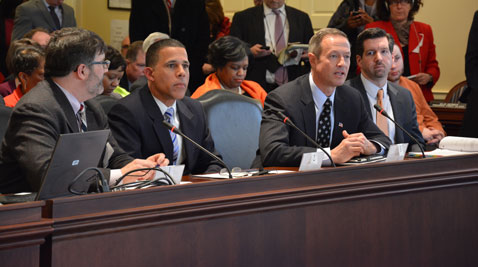Business owners, low-wage workers, economists and community leaders crowded into an overflowing House committee room Tuesday to offer testimony alongside Gov. Martin O’Malley on a handful of proposals seeking to change Maryland’s minimum wage.
Echoing last month’s State of the State address, O’Malley urged members of the Economic Matters Committee to support an increase of the state’s minimum wage, saying that a hike would put money into the pockets of Maryland’s middle class and strengthen the state’s economy as whole.

O’Malley has touted a minimum wage increase as his central priority this session, throwing his support behind the Maryland Minimum Wage Act of 2014, which captured much of the spotlight Tuesday. The bill would raise the state’s minimum wage to $10.10 an hour by 2016 and bump the base rate of pay for tipped workers from 50 to 70 percent of the minimum wage, indexing both rates to the cost of living beginning in 2017.
“This is a reasonable step to take. It is the right step to take economically,” O’Malley said. “If we want a stronger economy, if we want more customers for businesses, if we want economic growth, than we should raise the minimum wage.”
More than 100 witnesses signed up to testify both in support and opposition of a minimum wage increase, lining the walls of the committee room early on and trickling into an overflow room set up down the hall.
Much of the early testimony, including statements from Attorney General Doug Gansler and Lt. Gov. Anthony Brown, said that an increase in the minimum wage would pull many full-time workers who earn the base pay, and their families, above the federal poverty line.
“We’re failing our workers if we’re telling them that they can work a full day … and yet be unable to go home and support their family,” Brown said.
Other supporters, like Charmington’s Cafe owner Amanda Rothschild, said that a minimum wage increase would benefit small businesses by increasing retention rates and saving businesses money on turnover. Rothschild said a hike would also benefit her business because it would allow more low-wage workers in Baltimore, where her cafe is located, to spend money at her coffee shop.
But many other small business owners and representatives from companies like DavCo Restaurants, which operates more than 150 Wendy’s restaurants in the region, said a minimum wage hike would seriously hurt them, forcing them to cut jobs and potentially shut down.
Many called the governor’s bill extreme, arguing that an increase to $10.10 an hour would come as a shock to businesses.
Louis Santoni, president of Santoni’s Marketplace & Catering in Baltimore, said that a $10.10 minimum wage would cost his business three times its average net profit.
“I was listening to our governor earlier today … and he said the most important thing is developing the middle class. Well, that’s who I am. I’m the middle class,” Santoni said. “I’m the job creator. I’m the one who’s putting my house on the line and investing and bringing kids into work for their first job.”
Both sides battled what they pointed out as misconceptions — the misconception that all business owners are rich, for the hike’s opponents; while proponents of the increase argued that it is a misconception that most minimum wage workers are teenagers.
Santoni, like others, asked lawmakers to consider one of the more moderate bills that call for a smaller, one-time increase.
Another set of minimum wage bills is scheduled to go before the Senate Finance Committee on Thursday.


You must be logged in to post a comment.